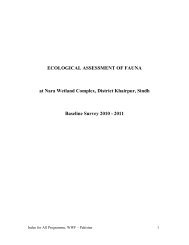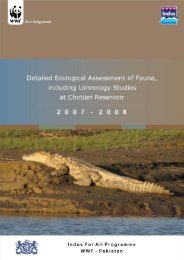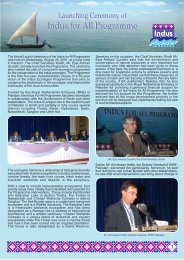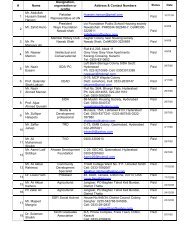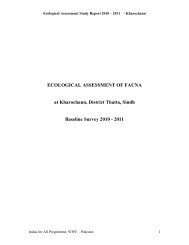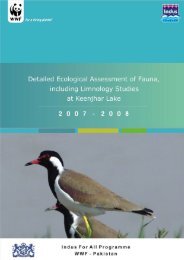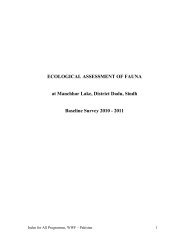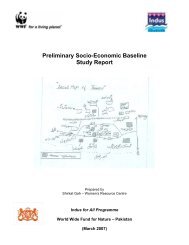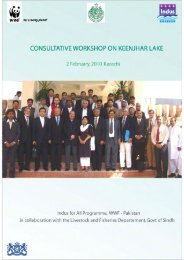Download - foreverindus.org - WWF - Pakistan
Download - foreverindus.org - WWF - Pakistan
Download - foreverindus.org - WWF - Pakistan
Create successful ePaper yourself
Turn your PDF publications into a flip-book with our unique Google optimized e-Paper software.
A Quarterly Newsletter of the Indus For All Programme, <strong>WWF</strong> - <strong>Pakistan</strong> Volume 1 Issue 2 April - June 2007<br />
EDITORIAL BOARD<br />
Syed Ghulam Qadir Shah<br />
Manager, Conservation Sindh<br />
<strong>WWF</strong> - <strong>Pakistan</strong><br />
Ali M. Khan Dehlavi<br />
Programme Economist<br />
(Indus For All Programme)<br />
A. Karim Gabol<br />
Communications Officer<br />
(Indus For All Programme)<br />
EDITOR<br />
Muhammad Zafar Khan<br />
Manager, Communications and Environmental<br />
Education (Indus For All Programme)<br />
CONTENTS<br />
Editorial<br />
Biodiversity Significance of the Indus<br />
Ecoregion<br />
Programme Highlights<br />
Comprehensive Ecological Assessment<br />
Indus Ecoregion Steering Committee Meeting<br />
Orientation and Team-building Exercise<br />
The Policy Monitor: Updates on Policy-level<br />
Developments<br />
The Poverty-Environment Watch<br />
Glimpses from the Programme<br />
Implementation Units<br />
Hepatitis Vaccination Camp at Sanghar<br />
World Environment Day-2007 Celebrations at<br />
Programme sites<br />
Interactive Theatre on Environmental Issues<br />
Medical Camp at Sakrand, Nawabshah<br />
Release of a captured Civet cat in Pai Forest<br />
Open Discussion Forum with local stakeholders<br />
Indus for All Programme’s Relief Efforts in Keti<br />
Bunder<br />
Mobile Medical Camp at Sanghar<br />
Meeting with District Nazima, Nawabshah<br />
HR News<br />
Other News<br />
Indus Forever is the quarterly newsletter of the Indus for All Programme;<br />
the first five-year (2007-2012) implementation phase of a 50-year vision of<br />
the Indus Ecoregion Conservation Programme. Funded by the Royal<br />
Netherlands Embassy in <strong>Pakistan</strong>, the Programme is being implemented by<br />
<strong>WWF</strong>- <strong>Pakistan</strong> in close collaboration with Government of Sindh. The<br />
Programme aims to conserve the rich biological diversity of the Indus<br />
Ecoregion through livelihoods improvement of the local communities. The<br />
newsletter aims to keep the stakeholders of the Programme, other concerned<br />
<strong>org</strong>anisations and individuals updated about the activities, progress and<br />
future endeavours of the Programme.<br />
Biodiversity Significance of the Indus Ecoregion<br />
Indus ecoregion is characterised by diverse habitat types consisting of<br />
coastal, freshwater and brackish wetlands, riverine forests, a vast desert<br />
and irrigated plains. The area is rich in biodiversity of significant ecological<br />
and economic importance to the country in general and to the local<br />
communities in particular.<br />
The Indus Delta has one of the largest arid climate mangroves cover in the<br />
world. It includes 17 major creeks besides a large number of minor creeks<br />
and mud flats. Although eight species of mangroves have historically been<br />
reported in the area, only four remain. These are Avicennia marina, Aegiceras<br />
corniculatum, Ceriops tagal and Rhizophora mucronata. In addition, the<br />
main delta area harbours at least 34 animal species, 138 bird species, 24<br />
reptile species and about 200 fish species.<br />
The coastal waters and associated wetlands attract a number of migratory<br />
birds. Some 56 bird species belonging to six orders and fourteen families<br />
have been reported in the Sindh coastal waters.<br />
The main river course is habitat of the blind Indus Dolphin. Moreover, a<br />
variety of fish species including Indus baril, Indus garua and the Golden<br />
mahasheer are found in the river. The riverine forests<br />
along the banks of the Indus support a variety of flora<br />
comprising of Acacia, Tamarix and Prosopis and fauna<br />
including Hog deer, Wild boar, Jackals and Foxes.<br />
1
Programme Highlights<br />
Comprehensive Ecological Assessment in the<br />
Programme sites<br />
The Indus for All Programme has initiated a detailed ecological<br />
assessment in the Programme’s four sites for the year 2007.<br />
A team of consultants, comprising of subject specialists from<br />
<strong>Pakistan</strong> Museum of Natural History, Islamabad, Sindh Wildlife<br />
Department, and <strong>WWF</strong>-<strong>Pakistan</strong> conducted the detailed fauna<br />
survey that also covered an additional site, Keti Shah (a<br />
riverine ecosystem in Sukkur). All the sites represent diverse<br />
ecosystems situated in the Indus Ecoregion. The survey,<br />
conducted from June 10 to 26, 2007, focussed on<br />
Herpatologist collecting samples in Chotiari<br />
mammals, birds, reptiles, fish and invertebrates. The study<br />
includes a detailed assessment of the abundance, seasonal<br />
frequency and distribution of the species. The study will identify<br />
the threats to the survival of the species, and suggest the<br />
remedial measures in this regard.<br />
The initial summer survey, will be followed by the Monsoon<br />
or Fall survey in October 2007 and winter survey in January<br />
2008. These surveys will give a better insight into the<br />
biodiversity of the area.<br />
A Lizard species found in Chotiari<br />
Indus Ecoregion Steering Committee Meeting<br />
The second meeting of the Indus Ecoregion Steering<br />
Committee (IESC) was held on 12 April 2007, in the Committee<br />
Room of Planning and Development Department, Government<br />
of Sindh. The Additional Chief Secretary (Development),<br />
Planning and Development Department, Government of Sindh,<br />
chaired the meeting. Some of the important decisions taken<br />
during the meeting were:<br />
1. a sub-committee of IESC for Indus for All Programme was<br />
constituted under the Chairmanship of the Secretary Forest<br />
and Wildlife Department;<br />
2. the newly constituted sub-committee of the IESC was<br />
authorized to review and recommend approval of the 5-year<br />
and 50-year logical framework analyses in its first meeting<br />
scheduled in July 2007;<br />
3. the work plans of Indus for All Programme were discussed<br />
and approved;<br />
4. the following new members were considered for inclusion<br />
into the IESC:<br />
the Small Grants Programme (SGP) of the UNDP<br />
Federal Planning Commission, Government of<br />
<strong>Pakistan</strong>.<br />
nd<br />
2 Meeting of the Indus Ecoregion Steering Committee, 12 April 2007<br />
Orientation and Team-building Exercise<br />
After completing induction of staff during the inception phase,<br />
the Indus for All Programme <strong>org</strong>anised an orientation visit and<br />
team building exercise from 20 to 28 April, 2007. As part of<br />
orientation, the team members visited <strong>WWF</strong> -<strong>Pakistan</strong>’s Head<br />
Office in Lahore and Programme Office in Islamabad. The<br />
team also met with the staff of the <strong>Pakistan</strong> Wetlands<br />
Programme in order to agree measures tto reduce duplication<br />
and foster joint ventures. The three-day team-building exercise<br />
took place in Abbottabad. Adventure Foundation <strong>Pakistan</strong><br />
facilitated the exercise. Through innovative and interactive<br />
learning approaches, the skills and knowledge of the team<br />
members were enhanced in leadership, teamwork and effective<br />
communication. Later, the team visited Ayubia National Park<br />
in Nathiagali. The Chief Conservator, Wildlife Department,<br />
NWFP and the Divisional Forest Officer Ayubia National Park<br />
briefed the team about conservation initiatives taken by NWFP<br />
Wildlife Department in general and Ayubia National Park in<br />
particular. Besides this, the team also visited the <strong>Pakistan</strong><br />
Museum of Natural History in Islamabad.<br />
2
The Policy Monitor<br />
Updates on Policy-Level Developments<br />
In order to include more target-oriented approaches for<br />
effective implementation of the Programme, and to identify<br />
the role of the stakeholder in this respect, over fifty one-onone<br />
introductory and confidence building meetings were held.<br />
The key line departments that were consulted include Sindh<br />
Planning and Development Department, Sindh Environment<br />
and Alternate Energy Department, Sindh Forest Department,<br />
Sindh Wildlife Department, Sindh Irrigation and Drainage<br />
Authority and Coastal Development Authority. As a result,<br />
MoUs have been drafted and focal persons have been<br />
identified to facilitate the Programme implementation.<br />
Parallel to the development of <strong>Pakistan</strong> Vision 2030, the<br />
Government of Sindh is currently finalizing Sindh Vision 2030<br />
to prioritize sectors and mobilize resources essential for<br />
sustainable development of the province. The consultative<br />
process for Sindh Vision 2030 provided an opportunity for<br />
introduction of the Indus Ecoregion Programme and its<br />
objectives to district-level stakeholders and mainstreaming<br />
of the same in the vision document.<br />
The Indus for All Programme is involved in the development<br />
of <strong>WWF</strong>-<strong>Pakistan</strong>’s Freshwater Policy Programme which<br />
focuses on integrating policy components of the <strong>org</strong>anization’s<br />
freshwater initiatives. In this regard, Manager Policy and<br />
Programme Development took part in a presentation and<br />
discussion on strategic synergies in two Fresh water<br />
Programmes that will become the focus of the <strong>WWF</strong>’s Policy<br />
initiatives.<br />
The Poverty-Environment Watch<br />
The aim of the Indus for All Programme is to improve economic<br />
opportunities for the communities residing in the surrounding<br />
areas of the four priority sites, i.e. Pai Forest, Chotiari<br />
Reservoir, Keenjhar Lake and Keti Bunder, while sustaining<br />
the natural resources on which the livelihoods of the local<br />
people depend. Accordingly, the role of the Programme<br />
Economist is to develop and administer initiatives relating to<br />
livelihoods, policy and natural resource management.<br />
The economist is also required to lead valuation exercises<br />
whose purpose is to place a monetary value on un-priced<br />
goods and services provided by the wetland ecosystems<br />
present in the Programme’s sites. In this connection, an inhouse<br />
Travel Cost Model and an accompanying questionnaire<br />
for Keenjhar Lake have been developed. The pre-testing of<br />
the questionnaire will be conducted in the third quarter of the<br />
implementation phase of the programme.<br />
Moreover, in order to profile the social and economic<br />
characteristics of the local communities as well as their<br />
access to natural, financial, social and physical capital, a<br />
socio-economic baseline study has been initiated. The<br />
preliminary results are expected by the 4th quarter of this<br />
year. The study is expected to help document levels of poverty<br />
and peoples’ dependence on natural resources in their<br />
respective areas. It will also help gather information on<br />
health, economic, policy and other shocks.<br />
The Programme commits to extend incorporation of Poverty-<br />
Environment dynamics into the policies and plans included<br />
in the government’s Poverty Reduction Strategy Papers<br />
(PRSPs) between 2007 and 2012. In this connection, the<br />
preliminary Terms of Reference for a consultant and a plan<br />
of action have been prepared for improved mechanisms of<br />
soliciting stakeholders’ inputs into the drafting process of<br />
PRSP documents.<br />
Glimpses from the Programme<br />
Implementation Units<br />
Hepatitis Vaccination Camp at Sanghar<br />
The Programme Implementation Unit (PIU) team in Sanghar<br />
actively supported the District Government in <strong>org</strong>anising a<br />
vaccination camp against Hepatitis at Village Chaudhary<br />
Barkat Ali on 11 May 2007. The purpose of the camp was to<br />
provide protection to the people of the area against the<br />
imminent threats of Hepatitis and provide advice on preventive<br />
measures against the possible infections. The staff joined<br />
hands with the District Government in bringing the people,<br />
particularly women and the elderly people, to the camp by<br />
providing transportation facilities. The event was an opportunity<br />
to sensitize people about sanitation issues and to disseminate<br />
information about the Indus For All Programme.<br />
Hepatitis Vaccination Camp in Sanghar, 11 May 2007<br />
3
World Environment Day-2007 Celebrations at<br />
Sanghar<br />
On the occasion of World Environment Day - 2007, the PIU<br />
Sanghar facilitated a seminar <strong>org</strong>anised by the local NGO<br />
Dharti Dost Sangat. With participation of the district and local<br />
government officials, representatives from various NGOs and<br />
a large number of volunteers, environmental issues were<br />
discussed and mitigation measures were prioritised. Environment<br />
and sanitation are among the worst problems faced by the<br />
community. The Taluka Nazim of Sanghar was the Chief Guest<br />
at the event. He assured the participants that actions would<br />
soon be taken to address sanitation problems and to keep a<br />
clean environment in the district. <strong>WWF</strong>-<strong>Pakistan</strong> offered to play<br />
its role in the networking between government and civil society<br />
<strong>org</strong>anizations in this respect.<br />
On the same day, the Programme staff visited the Degree<br />
College Sanghar, where they briefed the Principal and teachers<br />
about the objectives of the Programme with special reference<br />
to environmental awareness. Later on, the staff participated in<br />
tree plantation activity at the premises of the college.<br />
World Environment Day-2007 Seminar in Sanghar<br />
Interactive Theatre on Environmental Issues<br />
Organised in Sanghar<br />
To mark the World Environment Day - 2007, the PIU Sanghar<br />
<strong>org</strong>anised an interactive theatre on the embankment of Chotiari<br />
Reservoir on 5 June 2007. Over 2000 spectators including a<br />
large number of local community members, district and local<br />
government officials and representatives of various NGOs and<br />
media personnel attended the event. The theatre performers<br />
belonged to the “Jagartaa Group” of Sindh Development Society,<br />
a local NGO working on environmental awareness.<br />
The event helped highlight biodiversity issues and the negative<br />
effects of natural resources depletion on the livelihoods of the<br />
local people. Following theatre performance, a musical<br />
programme was held in which various folk artists performed.<br />
The poetry and songs focussed on various aspects of<br />
environmental conservation portrayed in the popular Sufi poetry<br />
of Sindh. The event was covered by print and electronic media.<br />
This includes news bulletins and articles, in addition to a 5minute<br />
documentary on Indus TV.<br />
Interactive Theatre in Sanghar 5 June 2007<br />
World Environment Day-2007 Celebrations at<br />
Nawabshah<br />
The Nawabshah PIU <strong>org</strong>anised an awareness-raising<br />
programme on “Melting Ice: A hot topic”, the theme for World<br />
Environment Day-2007. The event was attended by the<br />
representatives of local government, academia, and community<br />
members. Students from two schools of the area presented<br />
skits on the global warming. This programme was helpful in<br />
creating awareness among local stakeholders about the harmful<br />
effects of global warming and climate change.<br />
Speaking on the occasion, stakeholders raised their concern<br />
over unfavourable climate changes caused by global warming.<br />
The event was covered by the local print and electronic media<br />
which helped widely disseminate the message of the World<br />
Environment Day 2007.<br />
World Environment Day-2007 Celebrations in Nawabshah<br />
Medical Camp in Sakrand, Nawabshah<br />
The PIU Nawabshah <strong>org</strong>anized a one-day medical camp in<br />
Taluka Sakrand near Pai Forest on 21 June 2007, with the<br />
coordination of a local Community-Based Organization (CBO)<br />
“Sindhica Reforms Society, Nawabshah”. Medical staff of<br />
Nawabshah Medical College and Hospital, Taluka Hospital<br />
Sakrand, EDO Health, Nawabshah and Rotary Club Nawabshah<br />
participated in the medical camp and extended their support<br />
in <strong>org</strong>anisation of the medical Camp.<br />
4
In total, 780 patients belonging to 42 villages of Taluka Sakrand<br />
were treated at the camp. Most of the villagers who took part<br />
in the camp belong to villages within the 10 kilometre area of<br />
Pai Forest. The camp was divided in 7 different sections<br />
catering to the needs of patients with different ailments. The<br />
included Paediatrics ; General Physicians; Ear, Nose and<br />
Throat; Blood screening (Hepatitis B & C); Medicines;<br />
Tuberclouses (awareness); and Gynaecology with ultrasound<br />
facility.<br />
Medical Camp in Sakrand, Nawabshah<br />
During the camp, 25 ultrasounds of gynae patients were carried<br />
out. In the blood screening section, 55 blood samples were<br />
collected for Hepatitis testing. The Indus for All Programme<br />
provided medicines to the patients. Moreover, brochures and<br />
pamphlets were distributed to local communities for awareness<br />
regarding the significance of conserving natural resources.<br />
Release of a captured Civet cat in Pai Forest<br />
During the recent ecological survey of the Pai Forest area,<br />
the Indus For All Programme’s survey team was informed that<br />
a local villager has been keeping an unidentified wild animal.<br />
The team visited the person and identified the animal as a<br />
Civet cat. The survey team, together with the Sindh Wildlife<br />
Department (SWD) representatives, convinced the villager to<br />
release the rare species into the wild and the animal was set<br />
free in the Pai Forest by the villager himself. Mr. Rab Nawaz,<br />
the NRM Coordinator of the Programme, presented a shield<br />
and a cash reward to the villager for his contribution towards<br />
nature conservation.<br />
Release of Captured Civet cat in Pai Forest<br />
Open Discussion Forum with local stakeholders<br />
On World Environment Day (WED), the Programme’s Keenjhar<br />
Lake PIU <strong>org</strong>anised a dialogue among representatives of local<br />
CBOs and the NGOs working in the area with a purpose to<br />
discuss environment and natural resources issues of Keenjhar<br />
Lake.<br />
The discussion identified existing environmental issues of the<br />
district like sea-intrusion; water-logging and increasing salinity;<br />
excessive use of pesticides; over-fishing; illegal hunting;<br />
pollution from industries and deforestation.<br />
A significant number of NGOs and CBOs working in the district<br />
were represented including; HANDS, LEAD <strong>Pakistan</strong>, AKPBS,<br />
M.H. Panhwar Trust, <strong>Pakistan</strong> Press Foundation (PPF), Sindh<br />
Agriculture and Forestry Workers Cooperative Organization<br />
(SAFWCO).<br />
Indus for All Programme’s Relief Efforts in Keti<br />
Bunder<br />
Beginning from 22 June 2007, a strong Monsoon weather<br />
system over the North Arabian Sea swept over the Sindh<br />
coastal areas. The weather system then converted into a<br />
Tropical Cyclone (Yemyin No.03B). Under its influence, heavy<br />
rainfall, winds and extremely rough southwesterly wave action<br />
caused rapid destruction of housing in Keti Bunder. This<br />
devastated the livelihoods of coastal communities including<br />
inland and remote creek inhabitants. Initial estimates found<br />
that 5,220 families became homeless in Keti Bunder town<br />
alone with 200 improvised thatch huts destroyed and 4,200<br />
partially damaged, 135 boats damaged, half of all poultry and<br />
betel leaf sheds damaged, and half of all crops on 500 acres<br />
of agriculture land destroyed.<br />
Although Yemyin struck Balochistan province the hardest, it<br />
left behind intense rain-storms and flooding in Keti Bunder<br />
making fishermen families homeless and depriving them of<br />
boats - their only source of livelihood. Another post-cyclone<br />
effect was the spread of malaria and water-borne diseases<br />
such as diarrhoea. Fortunately, few human lives were lost<br />
(three dead in boat sinking incidents).<br />
Keti Bunder is one of the priority sites of the Indus for All<br />
Programme. In the wake of the destruction, the Programme<br />
5
esponded rapidly and provided rescue and relief and gauged<br />
the demand for rehabilitation of those affected. The site office<br />
team, in collaboration with other NGO’s, district government<br />
and local volunteers, managed to evacuate a majority of the<br />
local people from Keti Bunder town to safer locations.<br />
Besides this, the programme office also provided boat-fuel<br />
to other individuals and <strong>org</strong>anizations for distribution of relief<br />
goods in the inland and creek areas; conducted a rapid<br />
damage assessment to determine the extent of the damage<br />
and measure the scale of rehabilitation efforts required. All<br />
<strong>WWF</strong> staff participated in the exercise in spite of harsh weather<br />
conditions and accompanying threats. Thanks to generous<br />
support from Qarshi Industries, a water purification product<br />
was distributed to affectees. Qarshi Industries donated 6,300<br />
bottles of their famous water purification product Aab-e-Nuqra<br />
for the communities.<br />
Mobile Medical Camp at Sanghar<br />
The Programme Implementation team Sanghar <strong>org</strong>anised a<br />
Mobile Medical Camp on 17 June 2007 at Village Bakaar<br />
situated in the outskirts of Chotiari Reservoir. The Indus For<br />
All Programme sponsored three well-known doctors attending<br />
the camp. A significant population of about 2,200 from the<br />
small villages adjoining the Chotiari Reservoir benefited from<br />
the camp.<br />
The PIU Sanghar also used the event to raise awareness<br />
among local residents about the importance of natural<br />
resources and their conservation. Hence, messages about<br />
environment, health and hygiene and conservation-related<br />
information were disseminated through banners and other<br />
resource materials.<br />
Medical Camp at Chotiari<br />
Meeting with District Nazima, Nawabshah<br />
The Nawabshah PIU team <strong>org</strong>anised a meeting with Ms.<br />
Faryal Talpur, the District Nazima Nawabshah in her office<br />
on 9 June 2007. The team briefed the District Nazima about<br />
<strong>WWF</strong>-<strong>Pakistan</strong> and the Indus for All Programme, its objectives,<br />
implementation plans and future endeavours. Ms. Talpur<br />
inquired about various aspects of the Programme and<br />
particularly asked about plans related to Pai Forest. The team<br />
informed her that the Programme envisages a long term<br />
sustainable management plan for Pai Forest that will involve<br />
communities, relevant government departments and civil<br />
society to carryout collaborative efforts. The team also briefed<br />
Ms. Talpur on forthcoming vegetation survey in Pai Forest<br />
as part of the initial assessment towards long-term planning<br />
and implementation. Ms. Talpur stressed the need for habitat<br />
assessment of Crocodiles in Mundh Jumrao. The team noted<br />
that the <strong>Pakistan</strong> Wetlands Programme is planning to conduct<br />
ecological surveys of Ramsar sites, hence they would cover<br />
Deh Akro as well.<br />
The District Nazima assured <strong>WWF</strong> of her support in the<br />
Programme. She supported the Nawabshah PIU in <strong>org</strong>anising<br />
a medical camp in Sakrand.<br />
HR News<br />
Indus for All Programme’s Internship<br />
Programme Kicks off<br />
With the start of the implementation phase, the programme<br />
engaged its first interns namely, Abida Parveen from Jinnah<br />
University for Women, Karachi and Tehmina Afsar Ali from<br />
Indus Valley School of Arts, Karachi. Both the interns provided<br />
useful support to the Programme Economist and the<br />
Environmental Education and Communication component,<br />
respectively. The programme envisages a comprehensive<br />
internship programme to support young development<br />
professionals, researchers and students from various academic<br />
and research institutions to conduct research work on various<br />
themes about the Indus Ecoregion.<br />
<strong>WWF</strong>- People<br />
Nazima<br />
The following people joined the Indus For All Programme<br />
during the first quarter of the implementation phase.<br />
1. Mr. Dewan Hari Das, Environmental Education<br />
Officer - PIU Keti Bunder, Thatta<br />
2. Ms. Noushaba Malkani, Environmental<br />
Education Officer - PIU Pai Forest,<br />
Nawabshah<br />
6
3. Ms. Nazia Bano, Environmental Education<br />
Officer-PIU Kinjhar Lake, Thatta<br />
4. Mr. Naveed Ali Soomro, Environmental<br />
Education Officer- PIU Chotiari<br />
Reservoir, Sanghar<br />
5. Mr. Farooq Ahmed Laghari, GIS Analyst,<br />
Karachi<br />
Other News<br />
Updates from <strong>Pakistan</strong> Wetlands Programme<br />
Significant progress has been made in the <strong>Pakistan</strong> Wetlands<br />
Programme during the last quarter (April-June, 2007) in all<br />
the components. All the four site offices have been established<br />
and the staff has been hired. The survey programme has<br />
been initiated and covers nineteen Ramsar Sites at this stage.<br />
Surveys at Taunsa Barrage, Tanda Dam and Chashma<br />
Barrage has been completed. Moreover, a preliminary visit<br />
by Programme Donors and Partners was arranged to the<br />
Northern Areas to assess and review the Programme’s<br />
involvement in high Alpine Wetlands.<br />
Several training courses have been facilitated under the<br />
programme. Significant strides have been made in<br />
implementing the awareness raising component of the<br />
Programme. A wide range of awareness-raising activities on<br />
different occasions have been conducted during the quarter.<br />
Significant progress has been made in the Central Indus<br />
Wetlands Complex especially concerning the awareness<br />
campaign against the extensive killing and trade of freshwater<br />
turtles. In addition, the issue of cranes, marine turtles and<br />
other species of concern regarding wetlands are also being<br />
highlighted in other regions. ( Contributed by Shafaq Masood,<br />
Research Assistant to NPM, PWP)<br />
Completion of Tackling Poverty Project<br />
The EU - sponsored “ Tackling Poverty in <strong>Pakistan</strong>’s Coastal<br />
Communities through Sustainable Livelihoods” project<br />
completed its execution on 30 June 2007. The four year<br />
project focused on sustainable management of coastal<br />
mangroves and fisheries at four sites; Sandspit and Keti<br />
Bunder (Sindh province) and Sonmiani and Kalmat<br />
(Balochistan province). During its implementation, the project<br />
<strong>org</strong>anised local committees in the form of male and female<br />
CBOs/Groups and enhanced community awareness on natural<br />
resources and their relationship to livelihoods. The project<br />
took several initiatives related to policy, research and advocacy<br />
on participatory management of coastal mangroves and<br />
fisheries resource at the four sites.<br />
Syed Asad Ali Award 2007<br />
Two conservation activists from Balochistan received the<br />
Syed Asad Ali Conservation Award-2007 in a ceremony held<br />
on 3 May 2007, at the Wetland Centre Sandspit Karachi.<br />
Master Abdul Rasheed, a local community member from<br />
Sonmiani and Mr. Abdul Rahman, Deputy Park Ranger, Hingol<br />
National Park, Balochistan were nominated for this year’s<br />
award. The recipients were presented with shields and<br />
Rs.50,000 each as cash awards by the Chief Guest<br />
Prof. Dr. Syed Irtifaq Ali, the former Vice Chancellor of the<br />
University of Karachi.<br />
Sperm Whale Washed off at Gadani Beach<br />
A dead sperm whale was found washed off the beach of<br />
Gadani in Balochistan on 24 April 2007. The whale was 31.2<br />
feet long and 7.1 feet wide. This is the second recorded<br />
incident of sperm whale species being washed ashore on a<br />
<strong>Pakistan</strong>i beach. The first such incident was recorded at<br />
Manjaar village on the coast of Karachi on 8 December 2005,<br />
by the Cetacean Conservation Project team.<br />
Sperm whales are one of the deep diving species and generally<br />
feed at depths ranging between 200 and 2,000 meters.<br />
Beach Cleaning Activity at <strong>WWF</strong>-<strong>Pakistan</strong>,<br />
Wetland Centre, Karachi<br />
<strong>WWF</strong>-<strong>Pakistan</strong>’s Wetland Centre at Sandspit, with the support<br />
of Hong Kong Shanghai Banking Corporation (HSBC),<br />
<strong>Pakistan</strong>, <strong>org</strong>anised a beach cleaning activity on 5 June 2007<br />
at Sandspit.<br />
The event was aimed at creating awareness on marine turtle<br />
.After the event, participants visited the Wetland Centre where<br />
they were sensitised about the importance of beach<br />
7
Layout and design by Nida Shams<br />
cleaning through presentations and a documentary on marine<br />
turtles. Speakers from both <strong>org</strong>anisations emphasised the<br />
crucial role of the private sector as a partner in conservation<br />
initiatives. Turtle hatchlings were also released into the sea<br />
on the occasion.<br />
Sandspit/Hawkesbay is a globally important site for marin turtle<br />
nesting. The beach is sandy and the nesting habitat is<br />
concentrated along a 5 km stretch of the beach. Sindh Wildlife<br />
<strong>WWF</strong> and HSBC staff at Beach Cleaning Activity<br />
Indus For All Programme, <strong>WWF</strong> - <strong>Pakistan</strong><br />
Programme Management Unit (PMU)<br />
606, 607 Fortune Centre, Block-6 P.E.C.H.S, Shahra-e-Faisal, Karachi.<br />
Tel: 02-4544791-92, Fax: 02-4544790<br />
www.<strong>foreverindus</strong>.<strong>org</strong><br />
Chotiari Wetlands Complex<br />
House # 129/2, Housing Society,<br />
Near Government Boys High School,<br />
Nawabshah Road, District Sanghar, Sindh.<br />
Tel: 0235-542837, Fax: 0235-542791<br />
Keenjhar Lake<br />
House # B/112,<br />
Hashimabad Society Makli,<br />
District Thatta, Sindh.<br />
Tel: 0298-772318, 772319, 610426<br />
Programme Implementation Units (PIU)<br />
Department has been implementing a marine turtle conservation<br />
programme at the Karachi coast. <strong>WWF</strong> initiated its turtle<br />
conservation activities at the Karachi coast after establishing<br />
a Wetland Centre at the Sandspit beach.<br />
<strong>Pakistan</strong> is a signatory to the IOSEA Agreement on conservation<br />
of marine turtles.<br />
Upcoming Events<br />
Vegetation Survey in the Programme Sites,<br />
July 2007<br />
Launching Ceremony of the Indus for All<br />
Programme, August 2007<br />
Media Workshop, December 2007<br />
Keti Bunder<br />
Keti Bunder Town, P.O. Keti Bunder<br />
via P.O. Mirpur Sakro,<br />
District Thatta, Sindh.<br />
Tel: 0298-607685, 620291<br />
Pai Forest<br />
House # A-3, M.U.C.E.T Employees<br />
Co-operative Housing Society,<br />
District Nawabshah, Sindh.<br />
Tel: 0244-282496, Fax: 0244-282496<br />
“ Man has too long f<strong>org</strong>otten that the earth was given to him for usufruct alone,<br />
not for consumption, still less for profligate waste.”<br />
Ge<strong>org</strong>e P. Marsh<br />
8



